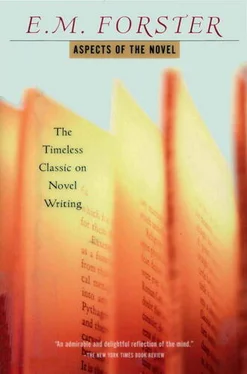"My poor man, you will bore your readers to death," cried Laura, unable to restrain her mirth.
"Not at all. To get my effect, I am inventing, as my central character, a novelist, and the subject of my book will be the struggle between what reality offers him and what he tries to make of the offer."
"Have you planned out this book?" asked Sophroniska, trying to keep grave.
"Of course not."
"Why 'of course'?"
"For a book of this type any plan would be unsuitable. The whole of it would go wrong if I decided any detail ahead. I am waiting for reality to dictate to me."
"But I thought you wanted to get away from reality."
"My novelist wants to get away, but I keep pulling him back. To tell the truth, this is my subject: the struggle between facts as proposed by reality, and the ideal reality."
"Do tell us the name of this book," said Laura, in despair.
"Very well. Tell it them, Bernard."
"Les Faux Monnayeurs," said Bernard. "And now will you please tell us who these faux monnayeurs are."
"I haven't the least idea."
Bernard and Laura looked at each other and then at Sophroniska. There was the sound of a deep sigh.
The fact was that ideas about money, depreciation, inflation, forgery, etc., had gradually invaded Edouard's book—just as theories of clothing invade Sartor Resartus and even assume the functions of characters. "Has any of you ever had hold of a false coin? " he asked after a pause. "Imagine a ten-franc piece, gold, false. It is actually worth a couple of sous, but it will remain worth ten francs until it is found out. Suppose I begin with the idea that—"
"But why begin with an idea?" burst out Bernard, who was by now in a state of exasperation. "Why not begin with a fact? If you introduce the fact properly, the idea will follow of itself. If I was writing your Faux Monnayeurs I should begin with a piece of false money, with the ten-franc piece you were speaking of, and here it is! "
So saying, Bernard pulled a ten-franc piece out of his pocket and flung it on the table.
"There," he remarked. "It rings all right. I got it this morning from the grocer. It's worth more than a couple of sous, as it's coated in gold, but it's actually made of glass. It will become quite transparent in time. No— don't rub it—you're going to spoil my false coin."
Edouard had taken it and was examining it with the utmost attention.
"How did the grocer get it?"
"He doesn't know. He passed it on me for a joke, and then enlightened me, being a decent fellow. He let me have it for five francs. I thought that, since you were writing Les Faux Monnayeurs, you ought to see what false money is like, so I got it to show you. Now that you have looked at it, give it me back. I am sorry to see that reality has no interest for you."
"Yes," said Edouard: "it interests me, but it puts me out." "That's a pity," remarked Bernard. [5] Paraphrased from Les Faux Monnayeurs, pp. 238-246. My version, needless to say, conveys neither the subtlety nor the balance of the original.
This passage is the centre of the book. It contains the old thesis of truth in life versus truth in art, and illustrates it very neatly by the arrival of an actual false coin. What is new in it is the attempt to combine the two truths, the proposal that writers should mix themselves up in their material and be rolled over and over by it; they should not try to subdue any longer, they should hope to be subdued, to be carried away. As for a plot—to pot with the plot, break it up, boil it down. Let there be those "formidable erosions of contour" of which Nietzsche speaks. All that is prearranged is false.
Another distinguished critic has agreed with Gide —that old lady in the anecdote who was accused by her nieces of being illogical. For some time she could not be brought to understand what logic was, and when she grasped its true nature she was not so much angry as contemptuous. "Logic! Good gracious! What rubbish!" she exclaimed. "How can I tell what I think till I see what I say?" Her nieces, educated young women, thought that she was passée; she was really more up to date than they were.
Those who are in touch with contemporary France say that the present generation follows the advice of Gide and the old lady and resolutely hurls itself into confusion, and indeed admires English novelists on the ground that they so seldom succeed in what they attempt. Compliments are always delightful, but this particular one is a bit of a backhander. It is like trying to lay an egg and being told you have produced a paraboloid—more curious than gratifying. And what results when you try to lay a paraboloid, I cannot conceive—perhaps the death of the hen. That seems the danger in Gide's position—he sets out to lay a paraboloid; he is not well advised, if he wants to write subconscious novels, to reason so lucidly and patiently about the subconscious; he is introducing mysticism at the wrong stage of the process. However that is his affair. As a critic he is most stimulating, and the various bundles of words he has called Les Faux Monnayeurs will be enjoyed by all who cannot tell what they think till they see what they say, or who weary of the tyranny by the plot and of its alternative, tyranny by characters.
There is clearly something else in view, some other aspect or aspects which we have yet to examine. We may suspect the claim to be consciously subconscious, nevertheless there is a vague and vast residue into which the subconscious enters. Poetry, religion, passion—we have not placed them yet, and since we are critics—only critics—we must try to place them, to catalogue the rainbow. We have already peeped and botanized upon our mothers' graves.
The numbering of the warp and woof of the rainbow must accordingly be attempted and we must now bring our minds to bear on the subject of fantasy.
A COURSEof lectures, if it is to be more than a collection of remarks, must have an idea running through it. It must also have a subject, and the idea ought to run through the subject too. This is so obvious as to sound foolish, but anyone who has tried to lecture will realize that here is a genuine difficulty. A course, like any other collection of words, generates an atmosphere. It has its own apparatus— a lecturer, an audience or provision for one, it occurs at regular intervals, it is announced by printed notices, and it has a financial side, though this last is tactfully concealed. Thus it tends in its parasitic way to lead a life of its own, and it and the idea running through it are apt to move in one direction while the subject steals off in the other.
The idea running through these lectures is by now plain enough: that there are in the novel two forces: human beings and a bundle of various things not human beings, and that it is the novelist's business to adjust these two forces and conciliate their claims. That is plain enough, but does it run through the novel too? Perhaps our subject, namely the books we have read, has stolen away from us while we theorize, like a shadow from an ascending bird. The bird is all right—it climbs, it is consistent and eminent. The shadow is all right—it has flickered across roads and gardens. But the two things resemble one another less and less, they do not touch as they did when the bird rested its toes on the ground. Criticism, especially a critical course, is so misleading. However lofty its intentions and sound its method, its subject slides away from beneath it, imperceptibly away, and lecturer and audience may awake with a start to find that they are carrying on in a distinguished and intelligent manner, but in regions which have nothing to do with anything they have read.
It was this that was worrying Gide, or rather one of the things that was worrying him, for he has an anxious mind. When we try to translate truth out of one sphere into another, whether from life into books or from books into lectures, something happens to truth, it goes wrong, not suddenly when it might be detected, but slowly. That long passage from Les Faux Monnayeurs already quoted, may recall the bird to its shadow. It is not possible, after it, to apply the old apparatus any more. There is more in the novel than time or people or logic or any of their derivatives, more even than Fate. And by "more" I do not mean something that excludes these aspects nor something that includes them, embraces them. I mean something that cuts across them like a bar of light, that is intimately connected with them at one place and patiently illumines all their problems, and at another place shoots over or through them as if they did not exist. We shall give that bar of light two names, fantasy and prophecy.
Читать дальше












